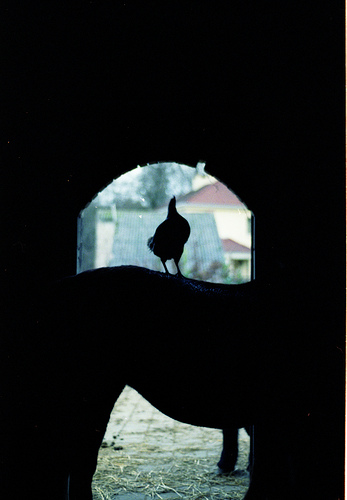Guest Post by Nancy Shulins*
My horse has taken up with a chicken. And I am not okay with that.
It’s not just the inane jokes from boarders at the barn where I keep Eli, my OTTB. “Hey, who’s the hot chick?” “Don’t look now, but your horse is getting henpecked!”
I laughed too, at first. But my outlook turned fowl one morning a few weeks ago, when I opened the door to Eli’s stall to deliver his breakfast and out came the poultry.
She was all legs and breast. And she’d obviously spent the night.
Eli hung his head and looked at me sheepishly from the far corner of his stall, clearly exhausted after a long night of … what, exactly? I had no idea.
Then it dawned on me she had been stalking him, hoping to catch him on the rebound from his passionate if doomed love affair with the new chestnut mare in the adjacent paddock.
The mare had been young and attractive, an off-the-track Thoroughbred like him. Eli had fallen head over hooves for her instantly, whinnying shrilly and deafeningly whenever she was out of his sight.
In the sixteen years that I’ve owned him, I’d seen this sort of thing before, at other barns with other horses. But Eli’s previous loves had been ancient blind ponies and fat, elderly mares, with the occasional gelding thrown in. This was different. For once, he had chosen an appropriate mate. I was kvelling.
The chestnut mare was sleek and pretty, and best of all, she’d returned his affection in kind, making it doubly painful – to say nothing of loud – when her owner abruptly decided to take her mare home to her own backyard barn.
I braced myself for the worst – a hunger strike and major depression weren’t unprecedented – but Eli accepted his soul mate’s departure with infinitely more grace than I. For the first time, I understood why my women friends went into mourning when their sons broke up with potential daughters-in-law whom they, too, had come to adore.
Exit the beautiful Thoroughbred.
Enter the drab little chicken.
The mare hadn’t been gone a week when I first heard her successor’s bizarre vocalizations as I groomed Eli in the aisle between stalls. A cross between a moan and a groan, it sounded weirdly sexual, enough so that I put down my curry comb and went searching for the source. I found her right around the corner, scratching for bugs in a pile of spilled hay.
She was a dull, rusty brown, not much to look at as chickens go. The last survivor of the barn owner’s original clutch of egg-layers, she was the only one that hadn’t fallen prey to the coyotes that had turned the coop into their own fast-food joint.
As days passed, I began to see this feathered jezebel in the barn more and more, scratching and pecking at the bedding in stalls whose occupants were out in their paddocks. At some point, she lost interest in the empty stalls and started cooling her scaly heels in Eli’s.
Unprepared though I was for their cohabitation, in retrospect I should have seen it coming. There were signs, little warnings I chose to ignore, like the day I confronted the surreal sight of my 1,254-pound horse watching over a freshly laid egg.
To be fair, mine is hardly the first Thoroughbred to fraternize outside his species. Racehorses began “friending” other animals centuries ago, long before Facebook turned the noun into a gerund.
It turns out pets are good for horses, which are, after all, inherently social beings meant to live together in herds. Like people, they do better when they have companionship. Racehorses in particular benefit from sharing their quarters, since the bulk of their time is spent idly confined to their stalls.
The solitary nature of their lives has given rise to a host of problems ranging from stomach ulcers to bad habits, also known as “stable vices.” Most are repetitive movements, corruptions of normal equine behaviors that have been rendered impossible by life in a stall. For a horse that’s fed highly concentrated grain twice a day, pacing, weaving and wood-chewing help eat up the hours they were meant to spend free-ranging for food.
Pairing racehorses with stall mates – goats, pigs, cats, ponies, and roosters – is a longstanding practice among trainers, since contented horses are less apt to pace at night and more likely to lie down and rest, making them better bets come post time.
At twenty-two, my horse’s racing days are far behind him. But the need for companionship is one he’ll never outgrow. And good friends are hard to find regardless of species. Who am I to say how his ought to look?
So, for however long this lasts, I’m committed to walking on eggshells.
A bird in the hand, after all.
*Nancy Shulins is the author of Falling For Eli: How I Lost Heart, Then Gained Hope Through the Love of a Singular Horse (Da Capo Press)



